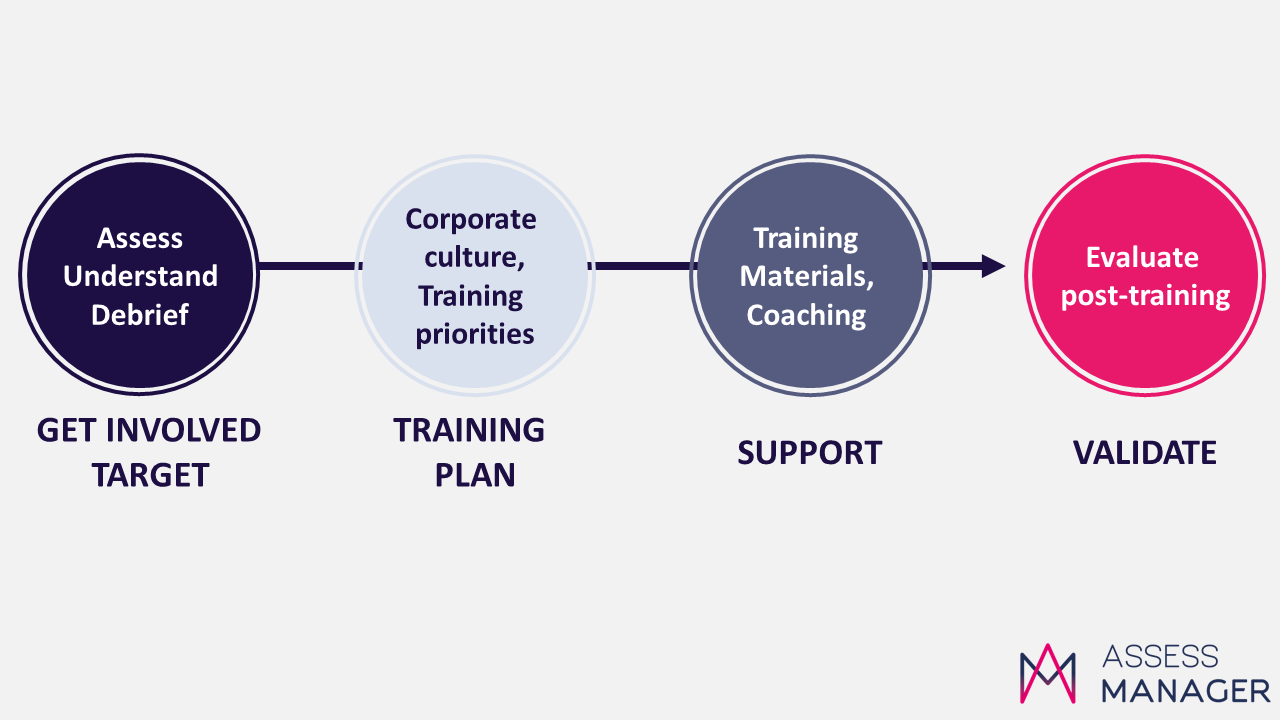Industrialising personalised management training programmes
Provoke the triggers that make people want to train
Optimise training investment

TRAINING PLAN / EDUCATIONAL TOOLS / COACHING
In this age of digitisation, blended learning, immersive learning, serious games and e-learning, Assess Manager offers innovative solutions in line with the challenges of optimising, customising and improving the efficiency of training.
We have listened to the needs of managers, as well as those responsible for training in SMEs and large groups, to offer you tailored solutions. Here are some of the questions that Assess Manager solutions answer:
- How can we raise managers’ awareness of their strengths and areas for improvement, get them to make the right decisions, and encourage them to want to progress and take training, even if they are reluctant to do so?
- How can a personalised training plan be industrialised for the company’s managers, with the best possible return on investment?
- How can training be used as a change management tool?
- How can we adapt teaching solutions to the participants?
- How can we identify the potential of future managers?
- How can we objectively measure progress following a support plan, whether this is achieved through training, coaching, co-development, etc.?
MANAGEMENT TRAINING PLAN: A GLOBAL SOLUTION

Assess Manager is aimed at the following people involved in talent development:
- Training departments, HR departments
- Grandes Ecoles, Corporate campuses
- Mobility and career services
- Management training centres
- Operational departments of SMEs
- Professional coaches
ILLUSTRATIVE CASE STUDIES – TRAINING PLAN – COACHING – PEDAGOGICAL ENGINEERING
UNDERSTAND, INVOLVE

Human Resources Departments deplore the low level of involvement of certain managers in their management training programmes, noting a dual phenomenon:
“The best managers sign up for training courses as soon as an opportunity arises, but those who are least at ease, those whom we would like to reach as a priority, are not very involved in their training programme, or even look for excuses not to take part and come reluctantly when the training course is compulsory”
“Acknowledging difficulties is sometimes difficult; for some people, signing up for training or coaching means being singled out. We need to prepare certain employees for this process
“We see defensive or closed attitudes among some managers, and we realise that this has a direct impact on the effectiveness of their teams, and sometimes even on their well-being. But how to break out of these positions, we can’t always find the key”
Individual solutions and test debriefs provide managers with subtle insights into themselves, identifying the keys to progress and, above all, understanding them. They are also a privileged time, in which saying your limits or difficulties is neither judged nor impactful, but simply an opportunity to identify action levers to target your support needs more precisely.
They are real triggers and bring together the desire to grow, to train in order to progress.
OPTIMISING THE TRAINING PLAN

“We’re all offered the same training path. It’s nice because it’s a different way for managers to meet each other, but it’s a real shame that I’m getting training in conflict management when I took a course on the subject in my previous company and I’m recognised for that quality. I certainly have other needs elsewhere, although I’m not sure what they are
Companies are increasingly introducing management training courses to avoid widening the gap between high-performing managers who take every opportunity to progress, and those who try to hide their difficulties.
However, training everyone on the same subjects can sometimes feel like a waste of time..
Collective solutions represent an enormous time-saver for training managers, who can focus on their higher added-value functions, which are more analytical and relational than organisational.
Assess Manager solutions allow you to automate a collective but individualised training plan. Individual test debriefing interviews can be used to confirm managers’ pre-registration, or to redirect priorities:
- Sometimes towards coaching rather than training
- Or by adapting training priorities to the manager’s responsibilities according to his or her function (context analysis).
CORPORATE CULTURE AND CHANGE – TRAINING MANAGERS

“In one local authority, a new HRD said: “Political changes are imposing changes that are provoking strong resistance among our staff. Demonstrating the need for change beyond the injunctions is a real step in a change management project
“In a company that was recently bought out by another company: “We bought a company that doesn’t operate in the same way as us at all. They’re disorganised and my teams don’t like working with them. On their side, they find us procedural and frustrating, and several have already left us to go and work for a competitor
Some structures and companies have a strong identity. Reorganisation projects are often accompanied by a change in corporate culture. Raising managers’ awareness of the impact of culture on their management style is a key stage in change management projects to determine new directions.
Assess Manager’s collective solutions are real levers for understanding the company’s cultural foundations and the strengths that flow from them. They are used in change management projects to take a snapshot at a given point in time and reinforce the company’s vision for the future.
TRAINING MATERIALS – COACHING

“I’ve already enrolled managers in training courses on time management and delegation several times, to no avail. The approach is very much focused on techniques and tools, whereas in fact almost everyone knows how to do things these days. What training needs to provide is the levers for putting things into action. What I really need is collective coaching”
On specific topics, we can work with trainees to identify the personality levers that impact their reactions to a managerial skill. Searching with them, using Assess Manager solutions, means involving them in understanding their own levers for change, and putting them at the centre of the solution. When the solution comes from them and they understand what to act on, we’ve won the game. It’s not the knowledge that’s lacking here, it’s the ability to implement it, which directly affects limiting beliefs.
This approach is used in individual or group coaching to accelerate the development of skills, going beyond knowledge.
Assess Manager solutions are used in teaching at various levels: on the themes of motivation, agility-adaptability, the roles of the manager, the levers for progress by targeted theme (delegation, organisation, communication, etc.), the complementary nature of a team despite its differences, etc
POST-TRAINING EVALUATION – A STAGE IN THE TRAINING PLAN

“We have managers who evaluate management training courses very positively, but we realise afterwards that the trainer was perhaps complacent and that the expected changes in behaviour are not forthcoming
Evaluating managers using the same solutions as before the training enables us to measure the real differences in skills, and in an objective way that goes beyond the declarative. In the same way, assessing the trainer himself will help you to identify his posture according to your needs: does he know how to get the message across and confront people with the limits of how they operate, while remaining benevolent? What “colour” of support do you need from the trainer or coach?
Assessing a manager’s progress following a training, coaching or co-development programme is made objective by re-testing and measuring gaps. Progress is assessed on an individual basis, and for the whole of the team trained.
Assess Manager solutions can become real keys to growth by guaranteeing a number of advantages: simplicity, speed, reliability, objectivity, security and confidentiality.
SYNTHESIS – TRAINING PLAN – COACHING – PEDAGOGICAL ENGINEERING
Assess manager offers solutions for :
1. Industrialise the customisation of management training courses:
– Simple tools (a questionnaire)
– A multi-purpose solution that enables everyone in the company to share the same solutions and speak the same language
2. Optimise your investments
– Strategic: Every euro invested in training has a known impact and identified results
– Operational: Managers take an active role in their own training programme

To go further with Assess Manager


